Lima Charlie’s Weekly Review: U.S. Politics Edition – Highlights of the week in U.S. domestic, geo, cyber, politics.
US Domestic Politics
Trump Set to Send 4,000 National Guard Troops to Mexican Border
On Friday, a Pentagon memo announced that as many as 4,000 US National Guard troops will be sent to the nation’s southern border with Mexico, in lieu of a wall in the current politically charged climate.
Following the $1.3 trillion dollar omnibus spending bill which passed last week without clear delineations for creating the wall President Trump ran on, the President appeared ready to take at least some measurable step toward that goal during a meeting with the Presidents of the Baltic Nations this week.
Of note however, the President cannot officially send troops to the border, under the Posse Comitatus Act. It should also be considered that exceptions have been made, most notably in 2006 and 2010, under Presidents Bush and Obama, respectively.
In particular, under Operation Phalanx, President Obama ordered the Department of Homeland Security to send 1,200 troops to secure the border and, since the beginning of that operation, National Guard airmen have been credited with halting 64,000 illegal border crossings along the Rio Grande portion of the border. Prior to this, in 2006, President Bush sent 6,000 National Guard members to New Mexico, California, Arizona, and Texas to aid border patrol agents. The full government accountability report from that order can be found here.

The guardsmen will likely not be armed, unless force is necessary, and while governors in Arizona and Texas have announced they will be sending guardsmen to the border, some, including Nevada Republican Governor Brian Sandoval and Oregon Democratic Governor Kate Brown suggested they would not comply with the order.
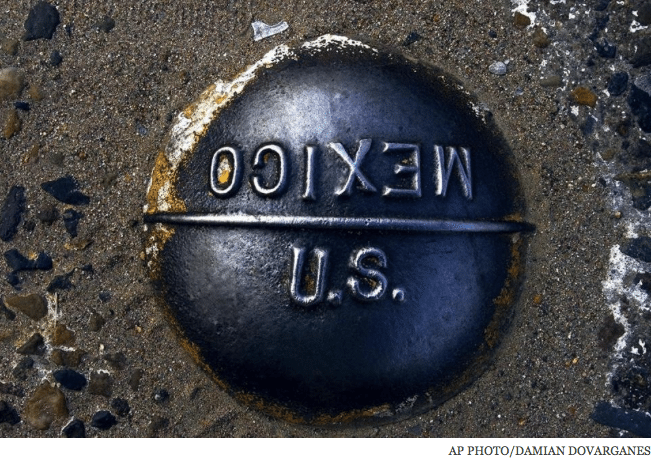
It should be noted that the Mexican Senate has expressed discontent with the move, claiming it will stop assisting the US in its fight against the cartels if the decision is actually carried out. A Senate resolution was passed on Thursday to end bilateral cooperation with the US in this respect.
Intel Committee Chairman Nunes Requests Original Document That Prompted Russia Investigation
US House Intelligence Committee Chairman Devin Nunes (R) has expressed a demand for the original FBI document that started the entire counterintelligence investigation into the alleged Russian connection with the 2016 Trump campaign.
Nunes set the deadline for receipt of the documents as April 11 and threatened to subpoena members of the FBI in the event of noncompliance.
The Chairman is also seeking access to the FISA applications the DOJ obtained to conduct surveillance on Carter Page, the former Trump campaign adviser.
While Senate Republicans have expressed that their investigation of the matter has come to an end, some remaining Democratic representatives intend to continue on with the case.
It should also be noted, however, that the investigation into alleged Russian ties by the Trump Campaign has been a central topic of discussion for the Representative, seeking a ninth-term in the upcoming Congressional election. While Nunes is favored to win, the topic is likely to cement the largely Republican base of supporters which will make his 2018 bid more solid.
Mueller Mentions Trump as Subject, Not “Criminal Target,” According to Reports
On Tuesday, reports surfaced that the Trump Administration’s legal team was notified by Special Counsel Robert Mueller that President Trump is “not a criminal target” of Mueller’s investigation.
According to the reports, while Trump is not a criminal target, he is a “subject”, making it possible that Mueller might still be interested in interviewing the President.
Earlier in the week, however, Representative Trey Gowdy (R) noted that the report does not necessarily signal an end to the ordeal, given that a new witnesses’ testimony could render the President relevant once again.
The news comes just as President Trump imposed his administration’s harshest sanctions to date on Russian business officials, including natural resource giants Oleg Deripaska, Viktor Vekselberg, and Russian tycoons and childhood friends of Putin, Igor Rotenberg and Kirill Shamalov.

YouTube San Bruno Shooting Leaves 3 Wounded, Shooter Dead
On Tuesday, 39-year-old Nasim Najafi Aghdam opened fire at YouTube’s San Bruno, California headquarters.

According to CNN, police spoke with Aghdam just hours before the shooting, having noticed she was living out of her car in a Mountain View parking lot and matched the description of a missing women, as reported by her parents.
The parents of the shooter noted that she held a long-standing grudge against the video content platform which she believed censored her. Aghdam is reported to have had more than four YouTube channels, each in different languages of English, Turkish, and Farsi.
Aghdam has contended in past videos that YouTube made her content ineligible for advertising revenue, known as demonetized. The platform raised its level for reaching monetization at the beginning of 2018, requiring 1,000 subscribers and 4,000 hours of viewing a month.
Aghdam’s attack does not fit the typical profile the country has unfortunately witnessed numerous times in recent memory, as a female shooter who used a 9mm handgun instead of an assault weapon, and an individual who had passed a background check for the gun and registered it, as well.
The shooting began just shortly after 12:45 PM on April 3rd and the San Bruno Police Department is set to launch a full investigation into the shooter’s background.
Trump Threatens Tariffs, While Leaving Door Open for Cooperation With Beijing
In a White House statement this week, President Trump expressed consideration for an additional $100 billion dollars in tariffs against China following Beijing’s move to suggest tariffs be placed on US products.
Under the US Office of the United States Trade Representative’s Section 301 Action, the USTR released a proposed list of Chinese products, following a statement from the President that “rather than remedy its misconduct, China has chosen to harm our farmers and manufacturers.”
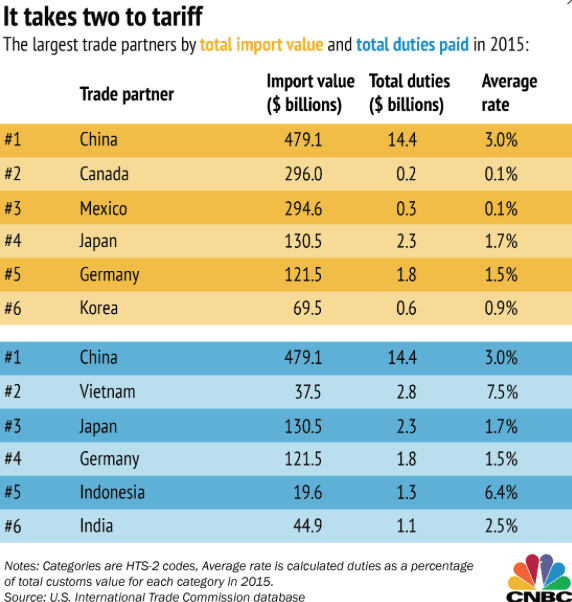
Demonstrating resilience in the face of these threats, however, Beijing has announced they will respond with “great strength”. Many experts fear Trump will carry out the move, signaling a response from Beijing which could match US tariffs with those of its own, a figure that could envelope all US exports to China.
Of note, President Trump did extend an invitation to China to work matters out cooperatively, expressing, “The US is still prepared to have discussions in further support of our commitment to achieving free, fair, and reciprocal trade.”
Cyber
World’s First Blockchain Smartphone in the Works
Sirin Labs and Foxconn have been selected to manufacture the world’s first blockchain smartphone. The Swiss-Israeli technology firm and the latter, an electronics manufacturer, will build a secure device that will store and utilize digital currencies like Bitcoin with no fees per transaction.
One benefit of the device lies in its potential to immediately convert tokens for application, without first passing through an exchange, according to Sirin.

Foxconn has been used in the past to assist in building phones for Apple and devices for Amazon. The device is set to be priced at around $799 and will have a triple-authentication system involving a password, biometrics, and behavioral information.
Project Maven DOD Drone Partnership with Google Prompts Employee Protests
In the spirit of the company’s official motto, “Don’t Be Evil,” Google and 3,000 of its employees are taking a stand against the corporation’s partnership with the US Department of Defense for the DOD’s “Project Maven.” The project is a drone program that is garnering assistance from Google to maintain its software for the program.
Project Maven is also referred to as the Algorithmic Warfare Cross-Functional Team and represents yet another foray into the world of merging machine learning with data.

The machine is set to utilize machine learning to identify objects and vehicles within the drone’s footage, to leave human workers with more complex tasks.
The protest has brought to light the risk involved in using artificial intelligence in military environments and conflict zones.
Google has not yet released a statement on its decision concerning remaining in the partnership or pulling out, but has stressed that it welcomes healthy employee discussion on the topic.
Geopolitics
Can Chile Become the First South American Country to Reach Developed Status?
On Sunday, conservative Sebastian Pinera, accepted the presidential sash as he returned to the presidency in Chile for a second term.
Pinera is a billionaire entrepreneur who is credited with introducing credit cards to Chile in the late 1970s. In an interview with the Miami Herald, Pinera expressed that Chile could become a developed country by 2025, which would make it Latin America’s first developed country.
There are some statistics which demonstrate this could happen, including the fact that the country has reduced poverty within its borders more than any other nation on the continent, by almost 40% by 1990. The nation has also maintained stability under center right and left governments in comparison to the more volatile nations within reach, such as Venezuela and Cuba.
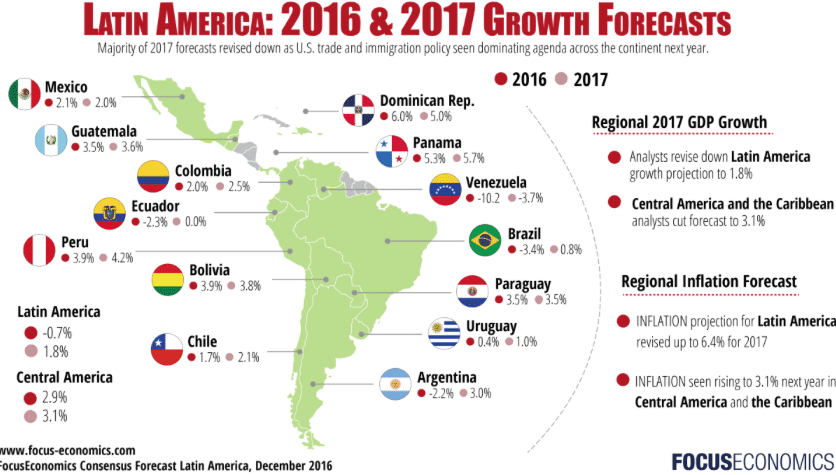
According to World Bank, Chile has been one of Latin America’s fastest-growing economies in the past 10 years, with the population in poverty or living on $4 per day decreasing to 7.9%. However, its GDP growth has fallen from a peak of 6.1% to 1.6% in 2016 due to lowered copper prices.
Chile has taken steps to revamp its position in the cybercurrency space, just this week launching a pilot project based on the Ethereum Blockchain network to record data from the country’s energy sector. The country has also made moves in the gas and oil industry, announcing this week that state-run energy firms from the nation will inaugurate a $354 million dollar project to increase production of natural gas off the southern tip of the continent.
Geopolitical Aviation Shortcut Sets Potential Precedent of Peace in Middle East
On Thursday, for the very first time, an Indian Airways passenger plane passed through Saudi Arabian airspace before landing in Ben-Gurion Airport in Tel Aviv.

The kingdom does not recognize Israel, in keeping with the position of many other Arab states and, thus, the move represents a positive step forward in stability in the region. Should the route open up for further air travel in the future, an important precedent of peace could be heralded in.
India launched the new flight from New Delhi to Tel Aviv on March 22 and Saudi Arabia provided the nation with the necessary permission to fly through its airspace.

During the last week of March, however, Israel’s national airline, El Al, which did not receive the same airspace approval, sued Israel. The nation believes the stance is an unfair one, given that flying directly across will eliminate two hours of flight time and provide Air India the means to sell its tickets at a lower price.
Conflict-Free Cobalt Needs Prompt Cobalt-Blockchain Partnership
A joint venture agreement has officially been inked between DLT Labs and Cobalt Blockchain Inc. to fuse blockchain technology with the supply chain tracking of cobalt and other minerals.
The platform will be geared toward companies who trade in precious and base minerals such as cobalt and diamonds. The move comes as the need for a transparent, traceable format for the movement of minerals grows ever-present. The pilot program will take place in the Democratic Republic of Congo.
With rising demand for jet engines, gas turbines, and smartphones, cobalt is a hotly contested mineral and the venture will seek to provide block-chain-based conflict-free cobalt.
In February of 2018, blockchain was used for the very first time to track cobalt’s travels from the DRC’s mines to actual use in smartphones and cars.
Even in the diamond industry, the stones harness the power of blockchain, with each one using a digital fingerprint to ensure conflict-free travels. While the logistics are still being worked out, the plan of action, according to Reuters, is to provide each sealed bag of cobalt mined by a vetted artisanal miner with a digital tag which will then be entered on blockchain utilizing a mobile phone. On the next leg of its journey, a trader would record the details including weight, date, and time of receipt on blockchain and the protocol would be followed until the ore reached the smelter.
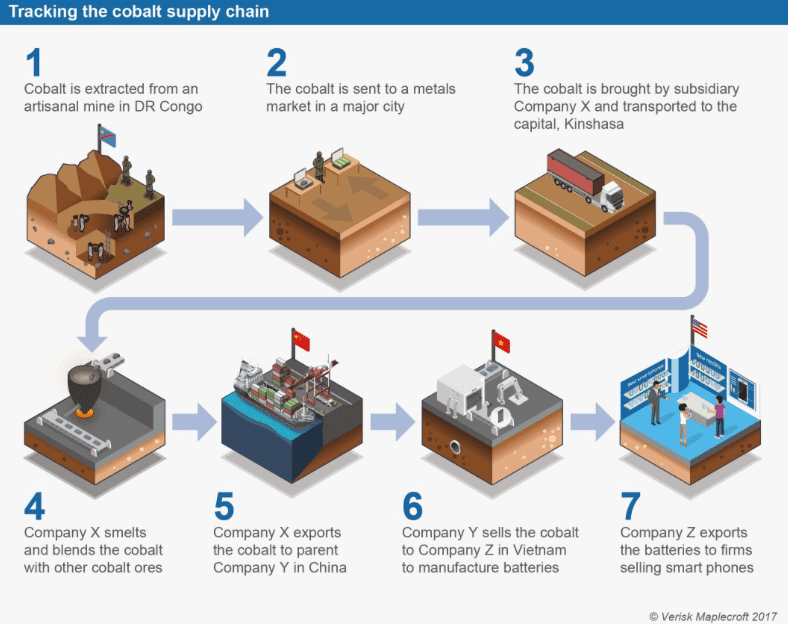
Many companies have taken the opportunity to bolster their own corporate social responsibility records, announcing support for the use of blockchain-backed cobalt.
Cuba Set to Mark Historic Milestone as Country Will Not be Ruled By a Castro for First Time in 5 Decades
With President Raul Castro leaving his position as leader of Cuba, the nation’s likely successor will not only be a non-Castro for the first time in almost 60 years, but will be a man largely unknown to the rest of the world.

Miguel Diaz-Canel, the current Vice President and member of the Politburo of the Communist Party of Cuba, is favored as the likely successor. Diaz-Canel’s positions are not likely to gel with those of the US or dissidents, however, as the leader has expressed in the past, “The US…invaded Cuba and put embargoes in place…Cuba did not do any of that, so in return for nothing they have to solve those asymmetries. We do not have to give anything in return.”
Diaz-Canel is the first person born after the 1959 Cuban Revolution to reach the position of Vice President and his hardline Marxist-Leninist stance makes him a likely enemy for dissidents. As he remarked, “I always tell the comrades, with whom I worked in this whole confrontation with the counterrevolution…the day we cut the money, the counterrevolution ends.”
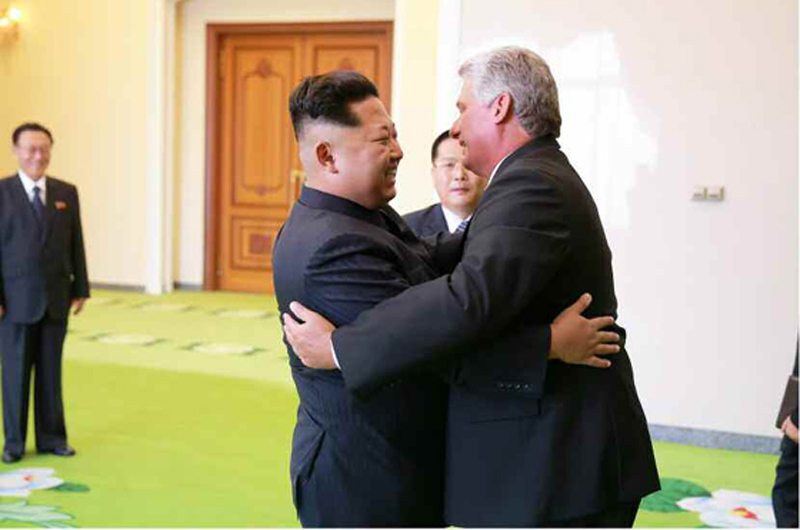
Stocks, Oil, and Currency
By the close of the week, and following announcements of new possible tariffs on Beijing, the Dow Jones dropped 572.46 points to 23,932.76, down 10% from a record high in January. The S&P 500 lost 58.37, the Nasdaq composite dropped 161.44 points to 6,915.11, and the Russell 2000 index of smaller-company stocks dropped 1.9% to 1,513.30.
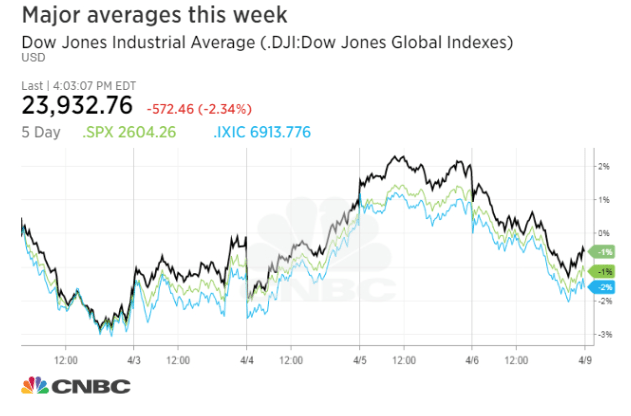
In oil, benchmark US crude dropped 2.3% to $62.06 a barrel and Brent crude lost $1.22 to reach $67.11 per barrel.
Gold and silver inched upward, however, with gold rising $7.60 to $1,336.10 an ounce and silver rising 1% to $16.36 an ounce.
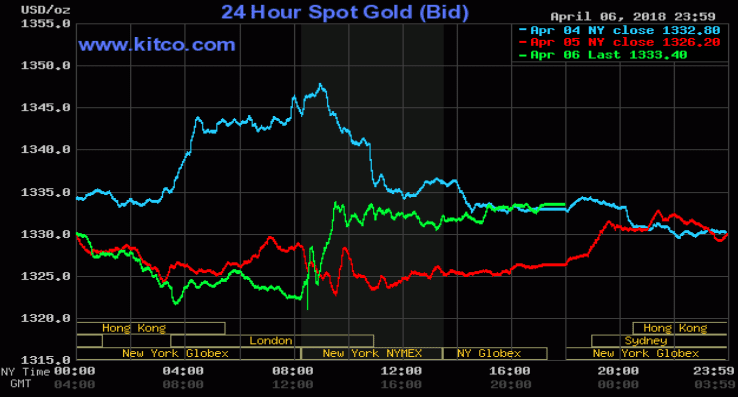
The Japanese Nikkei 225 Index dropped more than 0.5% and South Korea’s Kospi dropped 0.3%. In Hong Kong, the Hang Seng inched upward by 1.1%.
In currency, the dollar dropped to 106.85 yen and the euro inched upward to $1.2285 from $1.2256.
LIMA CHARLIE NEWS
[Edited by Nikita Roach]
Lima Charlie provides global news, insight & analysis by military veterans and service members Worldwide.
For up-to-date news, please follow us on twitter at @LimaCharlieNews
In case you missed it:

![Image The Week in U.S. Politics [Lima Charlie News]](https://limacharlienews.com/wp-content/uploads/2018/03/Lima-Charlie-Week-in-Politics-01.jpg)




![The Mind of Bolton - AUMF and the New Iran War [Lima Charlie News]](https://limacharlienews.com/wp-content/uploads/2019/05/Inside-the-mind-of-Bolton-Lima-Charlie-News-main-01-480x384.png)
![A Trump war crime pardon dishonors us all [Lima Charlie News]](https://limacharlienews.com/wp-content/uploads/2019/05/A-Trump-war-crime-pardon-dishonors-us-all-Lima-Charlie-News-480x384.png)


![Image Memorial Day may soon be a remembrance of democracy and those who had the courage to defend it [Lima Charlie News]](https://limacharlienews.com/wp-content/uploads/2018/05/Memorial-Day-may-soon-be-a-remembrance-of-democracy-and-those-who-had-the-courage-to-defend-it-Lima-Charlie-News-480x384.png)

![The Mind of Bolton - AUMF and the New Iran War [Lima Charlie News]](https://limacharlienews.com/wp-content/uploads/2019/05/Inside-the-mind-of-Bolton-Lima-Charlie-News-main-01-150x100.png)